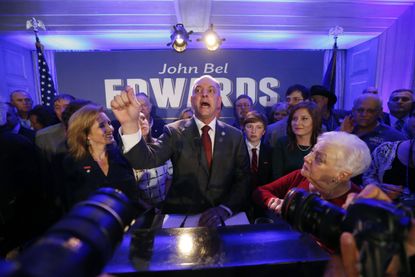Why progressives should support Louisiana's anti-abortion Democratic governor
He's still better than David Vitter


Even when you win, you typically can't have it all.
To wit: In Louisiana's recent gubernatorial election, Democratic state Rep. John Bel Edwards scored a rare win for the party in the Deep South, beating the scandal-tarred Republican Sen. David Vitter by an impressive 56.1 percent to 43.9 percent margin. It is far from an unambiguous progressive triumph, but it is a real one.
And yet... it's hardly all good news for the left. Edwards has a lot of conservative views, including on gun control and environmental policy. Perhaps most disturbingly, Edwards strongly opposes a woman's right to obtain an abortion.
Subscribe to The Week
Escape your echo chamber. Get the facts behind the news, plus analysis from multiple perspectives.

Sign up for The Week's Free Newsletters
From our morning news briefing to a weekly Good News Newsletter, get the best of The Week delivered directly to your inbox.
From our morning news briefing to a weekly Good News Newsletter, get the best of The Week delivered directly to your inbox.
Reproductive rights are a core Democratic value, period. National and blue-state Democrats should all favor reproductive rights. Edwards' terrible positions on reproductive rights shouldn't be ignored. Even if an opponent of reproductive rights has to be supported for tactical reasons, we shouldn't lose sight of the importance of reproductive freedom.
Given the importance of protecting a woman's right to choose, it is tempting to go further than that, and suggest that opposing reproductive rights should be a "dealbreaker" that makes supporting any candidate unacceptable regardless of the context. Tempting, but very wrong.
Let's start with this important fact: Edwards has announced that his first action in office will be to accept the Medicaid expansion offered to states by the Affordable Care Act. More than 200,000 poor people in Louisiana will have access to medical care that they didn't have before, alleviating a great deal of unnecessary pain and suffering. In addition, the influx of federal money will create jobs in one of the poorest states in the country. This is a huge deal.
The Louisiana election was not a question of whether the Medicaid expansion is more important than reproductive rights. Vitter is also a steadfast opponent of abortion rights, and for that matter, even a pro-choice governor would not be able to get rid of Louisiana's bad anti-abortion laws all by himself. The choice was between someone who is bad for reproductive rights and against Medicaid expansion and someone who is bad for reproductive rights and for Medicaid expansion. There's no choice for liberals there at all: You obviously vote for the latter. Telling poor people to wait for health care until an across-the-board liberal can win statewide election in Louisiana is a really bad idea. Not because reproductive freedom isn't extremely important, but because there are other crucial issues, and denying poor people health care wouldn't protect anyone's reproductive rights.
Indeed, "dealbreaker" logic simply doesn't work in the context of elections between polarized parties. The inevitable outcome of waiting until it's possible to address every major priority is that you would address none of them. Progressive voters in most elections, including every election for president ever, face the dilemma faced by progressive voters in Louisiana.
Let's consider the most progressive presidents of the last century. None would even come close to meeting every single progressive ideal. FDR? Not only was the New Deal suffused with white supremacist values, denying African-Americans their fair share of benefits, he ordered more than 100,000 people of Japanese descent into camps based on claims of military necessity many members of his administration knew to be specious at the time. LBJ, who signed probably the greatest package of progressive legislation since Reconstruction, ordered the escalation of the Vietnam War, leading to the pointless slaughter of a huge number of people. I don't think I need to belabor the many ways in which Barack Obama, the most progressive president since Johnson, has disappointed his liberal supporters.
The brutal truth is that politics requires making common cause with people who disagree with you. Putting off the Medicaid expansion in Louisiana until someone who would agree with blue state liberal Democrats on every issue would be as cruel and counterproductive as not passing Social Security and the National Labor Relations Act until the votes of segregationists were unnecessary, or to tell African-Americans and women that their civil rights could not be protected until Cold War liberals could be ejected from the Democratic coalition.
In the context of an election in which one party is significantly better than the other, "dealbreakers" represent a puerile form of anti-politics that make life worse for many people and better for nobody. When the Election Day comes, you pick the least bad choice, and you fight long-term to make the choices better.
Sign up for Today's Best Articles in your inbox
A free daily email with the biggest news stories of the day – and the best features from TheWeek.com
Scott Lemieux is a professor of political science at the College of Saint Rose in Albany, N.Y., with a focus on the Supreme Court and constitutional law. He is a frequent contributor to the American Prospect and blogs for Lawyers, Guns and Money.
-
 Assad's future life in exile
Assad's future life in exileThe Explainer What lies ahead for the former Syrian dictator, now he's fled to Russia?
By Elizabeth Carr-Ellis, The Week UK Published
-
 The best panettones for Christmas
The best panettones for ChristmasThe Week Recommends Supermarkets are embracing novel flavour combinations as sales of the festive Italian sweet bread soar
By Irenie Forshaw, The Week UK Published
-
 Kelly Cates to present Match of the Day
Kelly Cates to present Match of the DaySpeed Read Sky Sports presenter to take over from Gary Lineker at start of next season
By Elizabeth Carr-Ellis, The Week UK Published
-
 US election: who the billionaires are backing
US election: who the billionaires are backingThe Explainer More have endorsed Kamala Harris than Donald Trump, but among the 'ultra-rich' the split is more even
By Harriet Marsden, The Week UK Published
-
 US election: where things stand with one week to go
US election: where things stand with one week to goThe Explainer Harris' lead in the polls has been narrowing in Trump's favour, but her campaign remains 'cautiously optimistic'
By Harriet Marsden, The Week UK Published
-
 Is Trump okay?
Is Trump okay?Today's Big Question Former president's mental fitness and alleged cognitive decline firmly back in the spotlight after 'bizarre' town hall event
By Harriet Marsden, The Week UK Published
-
 The life and times of Kamala Harris
The life and times of Kamala HarrisThe Explainer The vice-president is narrowly leading the race to become the next US president. How did she get to where she is now?
By The Week UK Published
-
 Will 'weirdly civil' VP debate move dial in US election?
Will 'weirdly civil' VP debate move dial in US election?Today's Big Question 'Diametrically opposed' candidates showed 'a lot of commonality' on some issues, but offered competing visions for America's future and democracy
By Harriet Marsden, The Week UK Published
-
 1 of 6 'Trump Train' drivers liable in Biden bus blockade
1 of 6 'Trump Train' drivers liable in Biden bus blockadeSpeed Read Only one of the accused was found liable in the case concerning the deliberate slowing of a 2020 Biden campaign bus
By Peter Weber, The Week US Published
-
 How could J.D. Vance impact the special relationship?
How could J.D. Vance impact the special relationship?Today's Big Question Trump's hawkish pick for VP said UK is the first 'truly Islamist country' with a nuclear weapon
By Harriet Marsden, The Week UK Published
-
 Biden, Trump urge calm after assassination attempt
Biden, Trump urge calm after assassination attemptSpeed Reads A 20-year-old gunman grazed Trump's ear and fatally shot a rally attendee on Saturday
By Peter Weber, The Week US Published